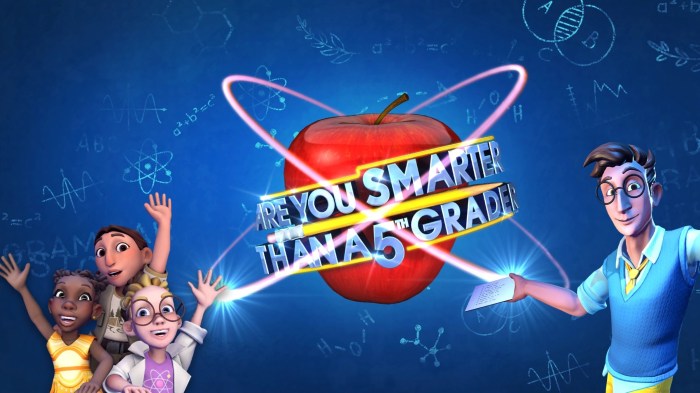Are you smarter than a 3rd grader – Are you smarter than a third grader? This question has been asked in popular games and shows, and it has sparked discussions about educational standards, cognitive abilities, and cultural significance.
In this article, we will explore the origins, implications, and cognitive requirements of the phrase “Are you smarter than a third grader?” We will also analyze the educational standards for third graders and discuss how this phrase can be used to motivate students and assess their progress.
Overview

The phrase “Are you smarter than a 3rd grader?” originated in the popular game show of the same name, which first aired in 2007. The show challenged adult contestants to answer questions that were typically included in the 3rd grade curriculum.
The phrase has since been used in other games, shows, and even advertisements.
Examples of popular games or shows that have used the phrase “Are you smarter than a 3rd grader?” include:
- The game show “Are You Smarter Than a 5th Grader?”
- The game show “Are You Smarter Than a 10 Year Old?”
- The children’s book series “Are You Smarter Than a 3rd Grader?”
- The educational website “Are You Smarter Than a 3rd Grader?”
Educational Standards: Are You Smarter Than A 3rd Grader

The educational standards for 3rd grade students vary from country to country and state to state. However, there are some general cognitive and academic skills that are typically expected of 3rd graders.
In English language arts, 3rd graders are typically expected to be able to read and write fluently, understand basic grammar and punctuation, and write simple essays. In mathematics, 3rd graders are typically expected to be able to add, subtract, multiply, and divide whole numbers, as well as solve simple word problems.
In science, 3rd graders are typically expected to be able to understand basic concepts about the natural world, such as the life cycle of plants and animals, the properties of matter, and the forces of nature. In social studies, 3rd graders are typically expected to be able to understand basic concepts about history, geography, and civics.
Content Analysis

The types of questions or challenges that are typically used to assess whether someone is “smarter than a 3rd grader” vary depending on the subject matter. However, there are some general categories of questions that are commonly used.
- Reading comprehension:These questions typically require the test-taker to read a short passage and then answer questions about the passage.
- Math problems:These questions typically require the test-taker to solve a simple math problem.
- Science questions:These questions typically require the test-taker to answer a question about a basic science concept.
- Social studies questions:These questions typically require the test-taker to answer a question about a basic social studies concept.
Cultural Significance
The phrase “Are you smarter than a 3rd grader?” has become a popular part of American culture. It is often used in a humorous way to challenge someone’s intelligence or knowledge.
The phrase has also been used in advertising and social media. For example, a popular advertising campaign for the fast food chain Wendy’s featured the slogan “Are you smarter than a 3rd grader? Then you know that Wendy’s has the best burgers.”
Cognitive Abilities
The cognitive abilities that are required to answer questions that are typically considered to be “3rd grade level” include:
- Reading comprehension:The ability to read and understand a short passage of text.
- Math skills:The ability to solve simple math problems.
- Science knowledge:The ability to understand basic science concepts.
- Social studies knowledge:The ability to understand basic social studies concepts.
These cognitive abilities are all important for success in school and in life. They are also important for being able to answer questions that are typically considered to be “3rd grade level.”
Educational Implications

The phrase “Are you smarter than a 3rd grader?” can be used in education to motivate students or assess their progress. For example, a teacher might use the phrase to challenge students to learn more about a particular subject. A teacher might also use the phrase to assess students’ understanding of a particular concept.
The phrase “Are you smarter than a 3rd grader?” can be a useful tool for educators. However, it is important to use the phrase in a positive way. The phrase should not be used to shame or embarrass students. Instead, it should be used to motivate students to learn more and to achieve their full potential.
Frequently Asked Questions
What are the educational standards for third graders?
Educational standards for third graders vary depending on the country and curriculum. However, in general, third graders are expected to have basic skills in reading, writing, and mathematics. They should also be able to solve simple problems, understand basic science concepts, and have a basic knowledge of history and geography.
What are the cognitive abilities required to answer third-grade level questions?
The cognitive abilities required to answer third-grade level questions include:
- Reading comprehension
- Problem-solving
- Logical reasoning
- Memory
- Attention
How can the phrase “Are you smarter than a third grader?” be used to motivate students?
The phrase “Are you smarter than a third grader?” can be used to motivate students by challenging them to think critically and apply their knowledge. It can also be used to help students identify areas where they need additional support.


